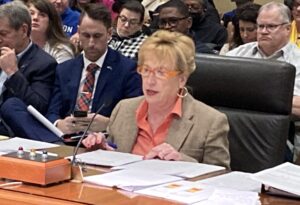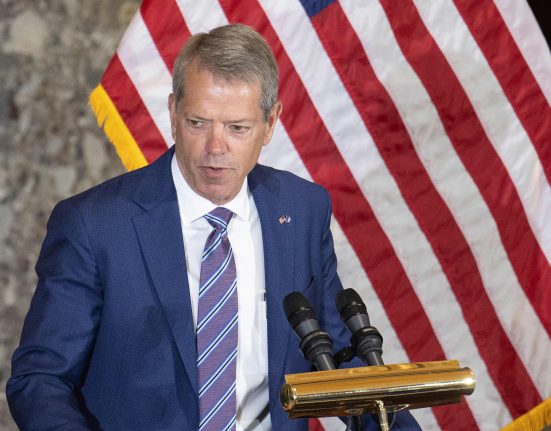LINCOLN — One of Nebraska’s most active conservative political groups said Monday it is launching a “six-figure” advertising campaign against Republican Gov. Jim Pillen’s proposals to offset property taxes by increasing the sales tax rate and culling exemptions.

Americans for Prosperity of Nebraska recently started mailing material to voters opposing the idea. This week, it is adding radio and digital ads, timed for the same week the Legislature’s Revenue Committee expects to announce its 2024 tax relief proposal.
The organization also plans to go door-to-door, campaign-style, engaging voters on their front porches about the plans. To put AFP’s advocacy into context, the group typically knocks on more doors in a given election cycle than either major political party.
The group typically focuses on lowering taxes and reducing regulation.
“We’re trying to educate the public about the tax shift scheme and warn them that it’s a bad deal,” said John Gage, AFP Nebraska’s executive director. “We shouldn’t be shifting taxes and calling it a tax cut because that’s not what it is.”
The script for the AFP radio ad, set in a Nebraska diner, has one farmer telling another the state is “trying to pass the largest tax increase in Nebraska history.” One of the mailers says Nebraska lawmakers are trying to pass “over $1 billion in new taxes.”
Pillen: Property taxes at crisis level
A Pillen spokeswoman on Monday said Nebraska’s property taxes are at a crisis level.

“We must land on a solution to keep Nebraska competitive with other states and keep people on fixed incomes in their homes,” said Laura Strimple, the spokeswoman. “Nebraskans are looking for leadership from their elected officials in solving this decades-old problem.”
It’s too early to specify what sales tax changes the committee will endorse, but State Sen. Lou Ann Linehan of Omaha said Monday that members are still considering a possible sales tax increase paired with caps to limit spending increases by local governments, among other ideas.
She expects the committee to decide on the sales tax proposal this week. The committee has previously discussed a 1-cent sales tax rate increase, which would raise about $531 million for state aid to K-12 schools. K-12 costs make up the bulk of Nebraskans’ property tax bills.
“I don’t like tax shifts, either,” Linehan said. “If we can put caps, real caps that work by providing the schools and governments more money and real caps that slow down their growth, then I’m willing to provide more state money.”
AFP wants hard caps
Gage said the AFP opposes any sales tax increase being used to offset property taxes because the tax relief is never dollar-for-dollar, as it is sold to the public. AFP has advocated for hard caps on local and school spending.

The group has questioned whether flexible state caps on local government spending, which they call soft, accomplish much if they make exceptions for annual growth and exempt large swaths of spending from caps, including public safety. Law enforcement and fire department expenses often make up a significant portion of local spending.
Gage said the Legislature should set harder caps on school spending, too. School groups have resisted such caps, saying they risk the future of Nebraska’s public schools by limiting local control and local decision-making.
“What senators should be focusing on is limiting spending and the growth of government at all levels of government and using that to do a tax cut,” Gage said.
Pillen and Linehan have stressed that the state’s tax system is out of balance, leaning too heavily on property taxes and too little on sales taxes. Both said the imbalance stands out more now because recent years’ income tax cuts are phasing in.
Linehan says taxes out of balance
Linehan shared a sheet showing that the average Nebraskan in recent years paid about $2,703 a year in property taxes, $1,628 in income taxes and $1,215 in sales taxes. Even if a property owner claimed all the recently passed property tax offsets and credits, the average Nebraskan’s property tax bill was still $2,234.

Pillen’s spokeswoman said the Legislature needs to decouple property taxes from valuation increases. Decoupling “requires a hard cap on all forms of local spending,” Strimple said.
“We must correct this imbalance to achieve transformative property tax relief,” she said.
Before the 2024 legislative session, Pillen pitched a sales tax increase of up to 2 cents. He has said he hoped lawmakers would use the money to offset 40% of property taxes by funding local governments and making more items subject to the tax.
Resistance to cutting exemptions, higher taxes
Like many governors before him, Pillen faced stiff resistance to eliminating sales tax exemptions from the various groups that worked to secure them, including home improvement contractors, senior citizens and newspaper chains.
Pillen faced additional pushback on the proposed sales tax increase from some state lawmakers on both sides of the aisle and from former Gov. Pete Ricketts, now a U.S. senator.
Gage said Ricketts, who helped found AFP Nebraska and backed Pillen’s bid for governor, is not funding the ads or the campaign and has not given the group money since being elected governor. Gage said the Koch-aligned group is being funded like most local AFP chapters — by donors in Nebraska and elsewhere whose names the group will not publicly disclose.
New approach or old trap?
For AFP, he said, the problem is not that state lawmakers want to ease property taxes. It’s that they appear to be falling into what Gage described as the old trap of believing they can spend their way out of the problem instead of sharply limiting local spending authority.
Without hard caps, local spending would still outpace the revenue from higher sales taxes. That would leave Nebraskans with both higher property tax bills and higher sales taxes. Gage said the group would oppose a sales tax increase “until the bill is dead.”
Linehan said AFP and other critics of the plans should keep their powder dry until they read the final proposals. She said the committee proposal would likely cap the authority of local tax entities to spend more money year over year.
“It’s easy to stand on the sidelines and yell,” Linehan said. “But I hear two messages. Property taxes are too high. And don’t do anything about it. We should be thankful that we have a governor that’s brave enough to do this.”
GET THE MORNING HEADLINES DELIVERED TO YOUR INBOX






